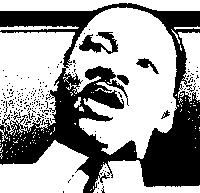 By a rare quirk of the calendar, Martin Luther King, Jr. Day this year falls on the first day of second-semester classes, giving Bowdoin a chance to include students in its celebration of King’s life and legacy. On Jan. 21, the college will host an evening of readings and performances by students, and remarks by Bowdoin staff and faculty.
By a rare quirk of the calendar, Martin Luther King, Jr. Day this year falls on the first day of second-semester classes, giving Bowdoin a chance to include students in its celebration of King’s life and legacy. On Jan. 21, the college will host an evening of readings and performances by students, and remarks by Bowdoin staff and faculty.
But Bowdoin’s engagement with the legacy of King will not end that day. The College will continue to recognize King’s enduring messages throughout the year, focusing in particular on his commitment to ending poverty.
Further, Leana Amaez, associate director of multicultural student programs, says the tribute will not neatly wrap up at the end of 2013, either. Continuing for the following two years, she is encouraging the Bowdoin community to find ways to bring attention to two other aspects of King’s legacy: his dedication to activism and to his faith.
“When we think of Martin Luther King, we think of the civil rights struggle; we think of the south; we think of Jim Crow laws. That is part of it, but his message went beyond that,” Amaez says. “I want students to think about what King’s message means today.”
For though King focused on urgent problems of his time, his “powerful message of equality, justice and peace” is still pressing, she said.
“If we struggle for these things through collective nonviolent action and accept nothing less, then what we obtain is his ‘Beloved Community’,” Amaez said, referring to King’s dream of a world in which conflicts are solved with nonviolence and human suffering, due to such things as poverty and racism, is not tolerated. “The hope is that students will ask questions: Are we there yet? Is this the beloved community? Is it happening here? How am I contributing? How can I contribute?”
The attention to MLK’s lasting impact will kick off at the Jan. 21 celebration, which will feature readings, songs and spoken word by students around the theme of creating a “Beloved Community through the collective nonviolent struggle to combat poverty,” according to the event write-up. Brian Purnell, assistant professor of Africana Studies, will also give a short reflection on King’s life and legacy, and Bowdoin’s new director of spiritual life, Bob Ives, will offer a benediction.
Following this, on Feb. 6, Craig Hickman will speak at Bowdoin. Hickman, a Harvard graduate and published author, was elected in 2012 to the Maine House of Representatives by a wide margin, campaigning on a platform that included ending hunger and supporting small farms.
Hickman runs an organic farm and a B&B near August, where he regularly serves free meals to the poor. He is also the second African-American to be elected to the Maine legislature.
“I invited him because he campaigned locally to end hunger, and he connected that with protecting the environment and local food,” Amaez said. “[This connection] adds another layer to Martin Luther King’s legacy of and his commitment to ending poverty.”
At the end of his life, King was very involved in this mission to end poverty, particularly through his work with the Poor People’s Campaign. “He was actually in Memphis supporting striking sanitation workers when he was assassinated,” Amaez noted.
“The hope is that students, staff and faculty will take this year to reflect on this particular part of King’s legacy,” she said.
